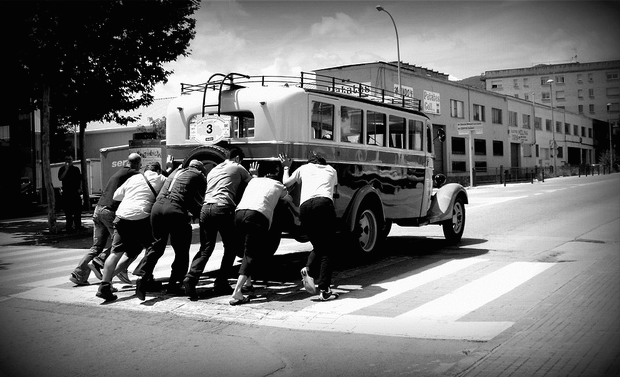 Inadvertently, Fiji has done Australia a favour in the diplomatic duel over what the South Pacific future should look like. Granted, you have to work hard to find positives in the arid argument that has reverberated around the region for eight years. The silver lining is that the contest Fiji has launched with the status-quo power, Australia, isn’t going to ebb away. It might be politer, but the debate lives. The destructive phase has finished. Time for some creation. That’s good for the Islands—and can be good for Australia. Canberra is going to have to pay attention and think new thoughts.
Inadvertently, Fiji has done Australia a favour in the diplomatic duel over what the South Pacific future should look like. Granted, you have to work hard to find positives in the arid argument that has reverberated around the region for eight years. The silver lining is that the contest Fiji has launched with the status-quo power, Australia, isn’t going to ebb away. It might be politer, but the debate lives. The destructive phase has finished. Time for some creation. That’s good for the Islands—and can be good for Australia. Canberra is going to have to pay attention and think new thoughts.
The status-quo power needs to work harder for its top-dog status, to deliver what the Islands need. Fiji will make it difficult for Australia to lapse into another period of comfortable South Pacific amnesia—set policy to cruise control and turn to Asia.
Fiji has injected politics into the Pacific. Politics is ever messy, and Fiji has delivered a lot of mess. Pity about the coup, the destruction of the Fiji polity, the desecration of key Fiji institutions and the derailing of much that regionalism should be delivering. As mentioned, you have to look hard to find the positives, but this is the look-on-the-bright-side moment. Canberra and Suva have agreed to talk Pacific politics.
Even if Suva’s Pacific arguments are flawed, Australia can’t rest on its usual status-quo assets—aid, the magnetic and nourishing effects of the huge Oz economy, the central role of the Forum and the traditional conservatism of Island leaders. New times invite new moves.
The South Pacific has no shortage of technocrats and regional institutions. Big changes and visionary leaps, however, don’t get served up by technocrats, no matter how they title the vision papers. Big politics needs politicians willing to grapple with political necessity. Fiji has delivered the necessity. The detente between Suva and Canberra opens the game. Australia and its status-quo partner New Zealand must respond.
This series of columns has covered the political dynamic in the shift from duel to dance unfolding in the ‘new era of partnership and prosperity’ proclaimed by Fiji and Australia; the conversation Fiji and Australia have launched on regional architecture; and Australia’s rethinking of economic possibilities in the Pacific after five fruitless years of PACER Plus negotiations.
PACER is the ultimate battle of the technocrats. The previous column pleaded for politicians to redefine the terms and scale of regional integration—to mix some real politics into the trade. Consider the political as well as economic aspirations in that PACER title: Pacific Agreement on Closer Economic Relations. The key is the CER part, reflecting 30 years of Closer Economic Relations between Australia and New Zealand.
Despite the layers loaded on CER by the econocrats and technocrats, CER was a political agreement between Australia and New Zealand as much as an economic deal. In the same way, the free-trade deals Australia has secured this year with South Korea, Japan and China are expressions of political agreement crowning the myriad and minutely-detailed give-and-take of trade talks (endless trench warfare waged at a table).
CER has delivered so much for Australia and New Zealand it takes an effort of imagination to recall that long ago it was a tough tussle in the trenches, with a big potential to fail or fall short. What would have happened to Australia–New Zealand relations if the politicians had wimped out and given in to sectional interests and parochial partisanship?
As the CER talks swerved toward failure, a senior Australian diplomat Rob Laurie sent a submission to the Foreign Minister in October, 1982, considering what a fiasco would do to the future. Read Laurie’s key thought, substituting the South Pacific for New Zealand:
We would nevertheless be concerned about the wider implications for relations with New Zealand if the CER process were to collapse. Without a new agreement the trading relationship would become complex and disputatious. Many New Zealanders (including the Government) would seek to blame Australia for their economic difficulties and for the failure of the CER effort. A New Zealand feeling that Australia had pressed for too much could in turn and in time have negative consequences for co-operation in other important areas such as ANZUS and the South Pacific.
When New Zealand crashed out of ANZUS a few years later, the economic linkages of CER were important ballast. Such history informs the argument that Australia and New Zealand must not allow PACER Plus to stagnate or collapse. Time for a political push—even a dash of vision—on what regionalism and economic integration can deliver for the South Pacific.
Graeme Dobell is the ASPI journalist fellow. Image courtesy of Flickr user Marina del Castell.

